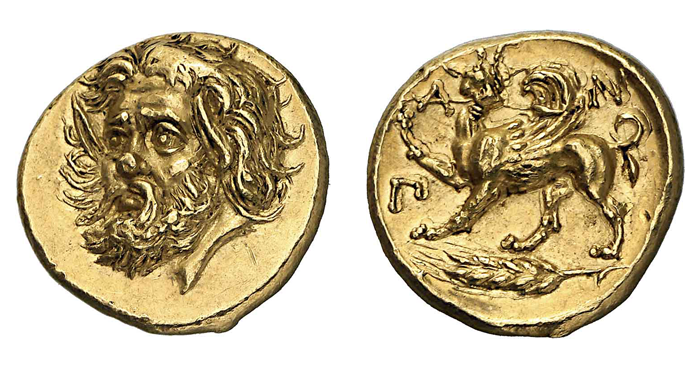The coin once belonged to the State Hermitage Museum until it was sold off by Joseph Stalin.A private collector has spent a pretty penny to get their hands on a 2,000-year-old gold Greek coin.

Known as a Panticapaeum stater, after the ancient Greek city in modern-day Crimea, the coin went for $6 million at Numismatica Ars Classica in Switzerland making it the most expensive ancient coin ever sold at auction.

The soaring price has been attributed to the coin’s quality, rarity, and the fact the supply of similar specimens is extremely limited with most already housed inside museums.

“I am extremely pleased with the phenomenal result the sale of the Panticapaeum stater achieved at our latest auction in Zurich,” Arturo Russo, co-director at Numismatica Ars Classica, said in a statement. “This is a sign the whole market for numismatics is flourishing, and is especially strong for ancients at the moment.”The coin was minted circa 340–25 B.C.E. and features a wide-eyed satyr on the obverse and that of a griffin gripping a spear in its beak on the reverse. The presence of the satyr, a mischief-maker in Greek mythology that resembles a man with horse ears and a tail, is thought to reference king Satyros I, who ruled a Greco-Scythian empire in eastern Crimea from 432 to 389 B.C.E.

The sharp details make numismatists confident the coin is the work of a master engraver. Unlike similar coins, this Panticapaeum stater features the satyr facing three-quarters to the left, as opposed to facing fully left, a detail experts believe was altered in an attempt to follow contemporary fashions.The coin was long part of the State Hermitage Museum’s collection, but was sold off in 1934 as part of Stalin’s push to sell works of art to raise foreign currency to fund domestic industrial growth. The coin was acquired by Charles Gillet, a French industrialist who focused on collecting rare books, furniture, and antiquities, including coins.





